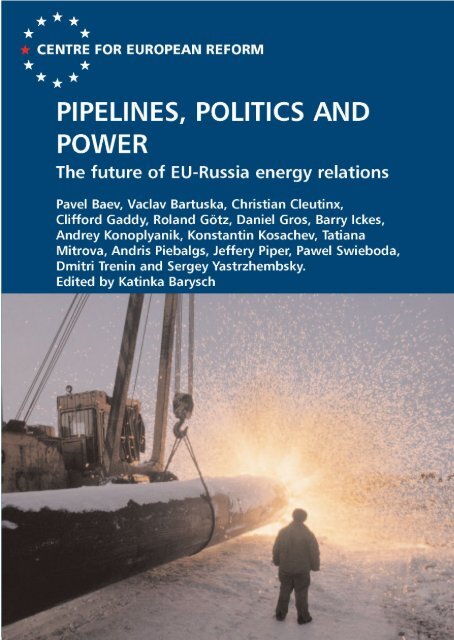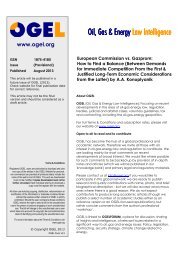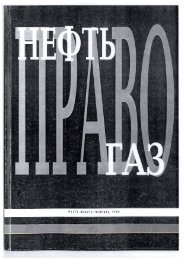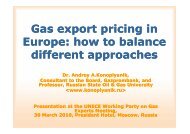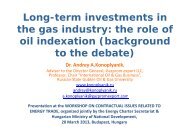Pipelines, politics and power: The future of EU-Russia energy
Pipelines, politics and power: The future of EU-Russia energy
Pipelines, politics and power: The future of EU-Russia energy
Create successful ePaper yourself
Turn your PDF publications into a flip-book with our unique Google optimized e-Paper software.
Q<br />
CENTRE<br />
H i<br />
*W R<br />
FOR <strong>EU</strong>ROPEAN REFORM<br />
PIPELINES, POLITICS AND<br />
POWER<br />
<strong>The</strong> <strong>future</strong> <strong>of</strong> <strong>EU</strong>-<strong>Russia</strong> <strong>energy</strong> relations<br />
Pavel Baev, Vaclav Bartuska, Christian Cleutinx,<br />
Clifford Gaddy, Rol<strong>and</strong> Götz, Daniel Gros, Barry Ickes,<br />
Andrey Konoplyanik, Konstantin Kosachev, Tatiana<br />
Mitrova, Andris Piebalgs, Jeffery Piper, Pawel Swieboda,<br />
Dmitri Trenin <strong>and</strong> Sergey Yastrzhembsky.<br />
Edited by Katinka Barysch
ЕЭ El<br />
К OB<br />
UROf EAN REFORM<br />
about the CER<br />
<strong>The</strong> Centre for European Reform is a think-tank devoted to improving the quality <strong>of</strong> the debate on the European<br />
Union. It is a forum for people with ideas from Britain <strong>and</strong> across the continent to discuss the many political,<br />
economic <strong>and</strong> social challenges facing Europe. It seeks to work with similar bodies in other European countries,<br />
North America <strong>and</strong> elsewhere in the world.<br />
<strong>The</strong> CER is pro-European but not uncritical. It regards European integration as largely beneficial but recognises<br />
that in many respects the Union does not work well. <strong>The</strong> CER therefore aims to promote new ideas for reforming<br />
the European Union.<br />
GIULIANO AMATO<br />
ANTONIO BORGES<br />
NICK BUTLER (CHAIR)<br />
IAIN CONN<br />
LORD DAHRENDORF<br />
VERNON ELLIS<br />
RICHARD HAASS<br />
LORD HANNAY<br />
LORD HASKINS<br />
FRANÇOIS HEISBOURG<br />
WOLFGANG ISCHINGER<br />
LORD KERR<br />
CAIO KOCH-WESER<br />
FIORELLA KOSTORIS PADOA SCHIOPPA<br />
RICHARD LAMBERT<br />
PASCAL LAMY<br />
DAVID MARSH<br />
DOMINIQUE MOÏSI<br />
JOHN MONKS<br />
BARONESS PAULINE NEVILLE-JONES<br />
CHRISTINE OCKRENT<br />
STUART POPHAM<br />
WANDA RAPACZYNSKI<br />
LORD ROBERTSON<br />
KORI SCHAKE<br />
LORD SIMON<br />
PETER SUTHERLAND<br />
LORD TURNER<br />
ANTÓNIO VITORINO<br />
IGOR YURGENS<br />
Director: CHARLES GRANT<br />
ADVISORY BOARD<br />
Former Italian Prime Minister<br />
Former Dean <strong>of</strong> INSEAD<br />
Director, Centre for Energy Security & Sustainable Development, Cambridge<br />
Group Managing Director <strong>and</strong> Chief Executive, Refining & Marketing, BP p.l.c.<br />
Former Warden <strong>of</strong> St Antony’s College, Oxford & European Commissioner<br />
International Chairman, Accenture<br />
President, Council on Foreign Relations<br />
Former Ambassador to the UN & the <strong>EU</strong><br />
Former Chairman, Northern Foods<br />
Senior Adviser, Fondation pour la Recherche Stratégique<br />
Global Head, Government Affairs, Allianz<br />
Chairman, Imperial College London <strong>and</strong> Deputy Chairman, Royal Dutch Shell plc<br />
Vice Chairman, Deutsche Bank Group<br />
Pr<strong>of</strong>essor, La Sapienza University, Rome<br />
Director General, <strong>The</strong> Confederation <strong>of</strong> British Industry<br />
Director General, WTO <strong>and</strong> Former European Commissioner<br />
Chairman, London & Oxford Group<br />
Senior Adviser, Institut Français des Relations Internationales<br />
General Secretary, European Trade Union Confederation<br />
National Security Adviser to the leader <strong>of</strong> the oppposition<br />
Deputy Director General, Audiovisuel Extérieur de la France<br />
Senior Partner, Clifford Chance<br />
Former President <strong>of</strong> Management Board, Agora SA<br />
Deputy Chairman, Cable <strong>and</strong> Wireless <strong>and</strong> Former Secretary General, NATO<br />
Adviser to the McCain Presidential Campaign<br />
Former Minister for Trade <strong>and</strong> Competitiveness in Europe<br />
Chairman, BP p.l.c. <strong>and</strong> Goldman Sachs International<br />
Chairman, Financial Services Authority<br />
Former European Commissioner<br />
Chairman <strong>of</strong> the Board, Bank Renaissance Capital<br />
<strong>Pipelines</strong>,<br />
<strong>politics</strong> <strong>and</strong><br />
<strong>power</strong><br />
<strong>The</strong> <strong>future</strong> <strong>of</strong> <strong>EU</strong>-<strong>Russia</strong><br />
<strong>energy</strong> relations<br />
Pavel Baev, Vaclav Bartuska,<br />
Christian Cleutinx, Clifford Gaddy,<br />
Rol<strong>and</strong> Götz, Daniel Gros, Barry Ickes,<br />
Andrey Konoplyanik,<br />
Konstantin Kosachev, Tatiana Mitrova,<br />
Andris Piebalgs, Jeffery Piper,<br />
Pawel Swieboda, Dmitri Trenin <strong>and</strong><br />
Sergey Yastrzhembsky.<br />
Edited by Katinka Barysch<br />
Published by the Centre for European Reform (CER), 14 Great College Street, London, SW1P 3RX<br />
Telephone +44 20 7233 1199, Facsimile +44 20 7233 1117, info@cer.org.uk, www.cer.org.uk<br />
© CER OCTOBER 2008 • ISBN 978 1 901229 85 1
EDITOR’S ACKNOWLEDGEMENTS<br />
I am extremely grateful to the experts, <strong>of</strong>ficials <strong>and</strong> politicians who<br />
have contributed to this report through their pr<strong>of</strong>ound knowledge,<br />
sharp analysis <strong>and</strong> enlightening opinions. I would particularly like to<br />
thank them for their patience <strong>and</strong> co-operation during the editing<br />
process. Combining 15 different essays in a short <strong>and</strong> readable<br />
volume required much shortening <strong>and</strong> simplification, as well as the<br />
addition <strong>of</strong> explanations <strong>and</strong> footnotes. I take full responsibility for<br />
any errors that have crept in in the process. Most <strong>of</strong> the authors<br />
would like to stress that the views they put forward here are their<br />
own, <strong>and</strong> are not necessarily representative <strong>of</strong> the organisations or<br />
institutions they work (or have worked) for. I would also like to<br />
thank my colleagues at the CER for their help with editing <strong>and</strong><br />
pro<strong>of</strong>-reading, in particular Charles Grant, Clara O’Donnell <strong>and</strong><br />
Bobo Lo. And as always a special thanks to Kate Mullineux for<br />
layout <strong>and</strong> production. Finally, the CER’s work on <strong>Russia</strong> would not<br />
be possible without the kind support <strong>of</strong> the German Marshall Fund<br />
<strong>of</strong> the US, BP <strong>and</strong> Shell.<br />
•<br />
Contents<br />
Editor’s acknowledgements<br />
1 Introduction<br />
Katinka Barysch<br />
2 Energy geo<strong>politics</strong> in <strong>Russia</strong>-<strong>EU</strong> relations<br />
Dmitri Trenin 15<br />
3 <strong>The</strong> <strong>EU</strong>-<strong>Russia</strong> Energy Dialogue<br />
Christian Cleutinx <strong>and</strong> Jeffery Piper 25<br />
4 Trust, not double st<strong>and</strong>ards: What <strong>Russia</strong> expects from the <strong>EU</strong><br />
Sergey Yastrzhembsky 35<br />
Box: Putting flesh on the bones <strong>of</strong> <strong>energy</strong> solidarity<br />
Pawel Swieboda 40<br />
5 Do we have a shared <strong>future</strong> in <strong>energy</strong><br />
Konstantin Kosachev 45<br />
1<br />
6 Win-win co-operation is possible in <strong>energy</strong><br />
Andris Piebalgs<br />
Box: First responsibility, then solidarity<br />
Vaclav Bartuska<br />
53<br />
57<br />
7 <strong>Russia</strong>’s slowing production: Policy failure or strategic decision<br />
Clifford Gaddy <strong>and</strong> Barry Ickes 61<br />
8 Dynamic development in <strong>Russia</strong>’s gas sector<br />
Tatiana Mitrova 71<br />
Copyright <strong>of</strong> this publication is held by the Centre for European Reform. You may not copy, reproduce,<br />
republish or circulate in any way the content from this publication except for your own personal <strong>and</strong> noncommercial<br />
use. Any other use requires the prior written permission <strong>of</strong> the Centre for European Reform.<br />
Box: <strong>The</strong> money benefits <strong>of</strong> diversification<br />
Daniel Gros 79
9 Asia-Pacific <strong>and</strong> LNG: <strong>The</strong> lure <strong>of</strong> new markets<br />
Pavel Baev<br />
10 A pipeline race between the <strong>EU</strong> <strong>and</strong> <strong>Russia</strong><br />
Rol<strong>and</strong> Götz<br />
Box: What is the Energy Charter<br />
Andrey Konoplyanik<br />
11 Regulating <strong>energy</strong> relations: Acquis or Energy Charter<br />
Andrey Konoplyanik<br />
Maps, graphs <strong>and</strong> table<br />
<strong>Russia</strong>n oil <strong>and</strong> natural gas at a glance<br />
Gas consumption, <strong>EU</strong> <strong>and</strong> Former Soviet Union, 1997-2007<br />
<strong>Russia</strong>n oil output, 1970-2007<br />
Government-proposed Far East oil <strong>and</strong> gas pipelines<br />
Primary <strong>Russia</strong>n oil <strong>and</strong> gas pipelines to Europe<br />
Predicted <strong>Russia</strong>n natural gas exports to non-CIS countries<br />
Common rules for evolving Eurasian <strong>energy</strong> market:<br />
Energy Charter Treaty or aquis<br />
83<br />
93<br />
103<br />
107<br />
12<br />
56<br />
63<br />
91<br />
92<br />
95<br />
114<br />
1 Introduction<br />
Katinka Barysch<br />
<strong>Russia</strong> is the world’s largest gas producer. <strong>The</strong> <strong>EU</strong> is the world’s<br />
biggest gas market. <strong>The</strong> two are neighbours. Logically, the <strong>EU</strong> <strong>and</strong><br />
<strong>Russia</strong> should have a well-developed <strong>energy</strong> relationship. <strong>The</strong> <strong>EU</strong><br />
gets over 40 per cent <strong>of</strong> its gas imports from <strong>Russia</strong>, <strong>and</strong> two-thirds<br />
<strong>of</strong> <strong>Russia</strong>’s gas exports go to <strong>EU</strong> countries. <strong>Russia</strong> is also the source<br />
<strong>of</strong> almost a third <strong>of</strong> the <strong>EU</strong>’s oil <strong>and</strong> a quarter <strong>of</strong> its coal imports.<br />
European companies are among the biggest investors in the <strong>Russia</strong>n<br />
oil, gas <strong>and</strong> electricity sectors. At the same time, <strong>Russia</strong>’s <strong>energy</strong><br />
giants want more access to the <strong>EU</strong> market, to raise capital <strong>and</strong> buy<br />
<strong>power</strong> stations <strong>and</strong> pipelines.<br />
<strong>EU</strong>-<strong>Russia</strong> <strong>energy</strong> relations should be<br />
straightforward, mutually beneficial <strong>and</strong> fastgrowing.<br />
But they are not. Many Europeans<br />
today perceive their reliance on <strong>Russia</strong>n <strong>energy</strong>,<br />
in particular gas, as a threat. 1 Some say that<br />
<strong>Russia</strong> uses <strong>energy</strong> as a political weapon <strong>and</strong><br />
cannot be trusted as a supplier. Others worry<br />
1 Oil is a more ‘fungible’<br />
commodity that is traded on<br />
global markets, whereas gas<br />
is predominantly delivered<br />
through pipelines, so there<br />
is a much more direct<br />
relationship between the<br />
supplier <strong>and</strong> the consumer.<br />
less about <strong>Russia</strong>’s willingness to sell <strong>energy</strong> abroad than its ability<br />
to do so. Despite record-high global prices, <strong>Russia</strong>’s output <strong>of</strong> oil<br />
<strong>and</strong> gas is stagnating, as <strong>Russia</strong>n companies are not investing enough<br />
in the exploration <strong>of</strong> new fields. At the same time, they talk about<br />
selling more gas to Asia <strong>and</strong> entering into the global market for<br />
liquefied natural gas (LNG). <strong>The</strong> European Union is therefore<br />
reinforcing its efforts to find alternative sources <strong>of</strong> supply, both<br />
geographically (mainly from North Africa <strong>and</strong> the Caspian region),<br />
<strong>and</strong> through developing renewable sources, clean(er) coal <strong>and</strong>, in<br />
some countries, nuclear <strong>energy</strong>.
03<br />
What is the Energy Charter<br />
Andrey Konoplyanik<br />
<strong>The</strong> Energy Charter dates back to a political initiative launched by the then<br />
Dutch Prime Minister Ruud Lubbers at an <strong>EU</strong> summit in 1990. <strong>The</strong> end <strong>of</strong> the<br />
Cold War <strong>of</strong>fered an unprecedented opportunity to overcome Europe’s<br />
economic division. Energy was the logical place to start since there was already<br />
significant east-west co-operation in this sphere, as well as physical links<br />
through existing oil <strong>and</strong> gas pipelines. Developing common rules <strong>of</strong> the game<br />
in this capital-intensive sector would reduce political risks related to the<br />
dissolution <strong>of</strong> the USSR <strong>and</strong> COMECON,<br />
42 ‘European’ is here defined as ‘transfacilitate<br />
the transfer <strong>of</strong> western capital, Atlantic <strong>and</strong> Europe’ in the meaning <strong>of</strong><br />
technology <strong>and</strong> know-how into the the Helsinki 1975 Conference on<br />
former Soviet Union (FSU), <strong>and</strong> increase Security <strong>and</strong> Co-operation in Europe.<br />
<strong>energy</strong> exports from the FSU to the West,<br />
in particular the <strong>EU</strong>. A political<br />
declaration on international <strong>energy</strong> co-<br />
operation, the European Energy<br />
43 Thomas Wälde (ed.), ‘European<br />
Energy Charter Treaty: An east-west<br />
gateway for investment <strong>and</strong> trade’,<br />
Kluwer Law International, 1996; Andrey<br />
Charter 42 , was adopted in December<br />
Konoplyanik <strong>and</strong> Thomas Wälde,<br />
1991, followed by the legally binding ‘Energy Charter Treaty <strong>and</strong> its role in<br />
Energy Charter Treaty (ECT), which was international <strong>energy</strong>’, Journal <strong>of</strong> Energy<br />
signed in December 1994 <strong>and</strong> entered <strong>and</strong> Natural Resources Law, No 4/2006.<br />
into force in April 1998. 43<br />
<strong>The</strong> ECT has two distinctive features. Firstly, it is the only body <strong>of</strong> legally<br />
binding international rules that is tailored specifically to the <strong>energy</strong> sector.<br />
Unlike other international economic treaties, it therefore takes into account<br />
the wider range <strong>of</strong> risks faced by <strong>energy</strong> companies (for example, geological<br />
risks) <strong>and</strong> the extraordinarily high capital needs <strong>of</strong> the <strong>energy</strong> industry. <strong>The</strong> ECT<br />
covers such areas as <strong>energy</strong> investment, trade <strong>and</strong> transit, <strong>and</strong> <strong>energy</strong><br />
efficiency. It <strong>of</strong>fers dispute settlement for disagreements between states, <strong>and</strong><br />
between states <strong>and</strong> investors.
04 05<br />
Secondly, the ECT membership includes a broad <strong>and</strong> diverse range <strong>of</strong> countries<br />
across Eurasia. A total <strong>of</strong> 51 European <strong>and</strong> Asian countries have signed or<br />
acceded to the ECT, <strong>and</strong> all but five have ratified it (see page 114). 44 <strong>The</strong> five<br />
44 All <strong>EU</strong> states are individual<br />
that have not are Australia, Belarus,<br />
signatories, but the ECT has also been Icel<strong>and</strong>, Norway <strong>and</strong> the <strong>Russia</strong>n<br />
signed collectively by the European<br />
Community <strong>and</strong> Euratom so the total<br />
number <strong>of</strong> parties to the treaty is 53.<br />
Federation. Belarus <strong>and</strong> <strong>Russia</strong> have<br />
accepted provisional application <strong>of</strong> the<br />
ECT in so far as it is compatible with their<br />
own constitution, laws <strong>and</strong> regulations. Another 20 states <strong>and</strong> ten<br />
international organisations have observer status in the Energy Charter, among<br />
them the US, Pakistan, China, Korea, Iran <strong>and</strong> ASEAN. Although the ECT<br />
initiative was initially focused on east-west co-operation in Europe, its scope is<br />
now considerably broader. <strong>The</strong> Energy Charter is therefore the natural basis for<br />
the evolving Eurasian <strong>energy</strong> market, which also includes (not geographically,<br />
but from an <strong>energy</strong>-economic perspective) North Africa.<br />
<strong>The</strong> ECT <strong>and</strong> its related legally binding documents constitute one dimension <strong>of</strong><br />
the Energy Charter. <strong>The</strong> other is the inter-governmental Energy Charter<br />
process. <strong>The</strong> Energy Charter <strong>of</strong>fers a depoliticised, <strong>energy</strong>-specific international<br />
forum which is unique in that it brings together producing, consuming <strong>and</strong><br />
transit countries. It allows its member-states not only to discuss new<br />
challenges in international <strong>energy</strong> markets, but to incorporate common<br />
concerns <strong>and</strong> underst<strong>and</strong>ings into new legally binding instruments.<br />
<strong>The</strong> ECT aims to help the development <strong>of</strong> open <strong>and</strong> competitive <strong>energy</strong><br />
markets. Its rules are meant as a minimum st<strong>and</strong>ard, which leaves each<br />
member-state free to follow its own path <strong>and</strong> speed towards market opening.<br />
Those countries that push ahead cannot dem<strong>and</strong> that other ECT members<br />
follow their particular market model, nor are they permitted to discriminate<br />
against companies from such countries in any way.<br />
A stable environment for investment <strong>and</strong> transit<br />
<strong>The</strong> Energy Charter is based on the idea that international flows <strong>of</strong> investment<br />
<strong>and</strong> technology in the <strong>energy</strong> sector are good for both the investing <strong>and</strong> the<br />
receiving country. <strong>The</strong>refore, one <strong>of</strong> the main aims <strong>of</strong> the treaty is to promote<br />
the predictability <strong>and</strong> transparency that allows for the huge investments<br />
needed for our <strong>future</strong> <strong>energy</strong> security. <strong>The</strong> ECT does not itself create<br />
investment opportunities for companies by forcing countries to give access to<br />
resources or break up their <strong>energy</strong> companies. <strong>The</strong>se are sovereign decisions<br />
for the member governments. However, once an <strong>energy</strong> investment is made,<br />
the treaty is designed to provide for stable relations between the foreign<br />
investor <strong>and</strong> the host government. Stability is particularly important in a sector<br />
where projects are highly strategic <strong>and</strong> capital-intensive, <strong>and</strong> where risks have<br />
to be assessed over the long term. <strong>The</strong> legal framework <strong>of</strong> the ECT helps to<br />
reduce non-commercial risks, such as discriminatory treatment, direct or<br />
indirect expropriation, or breach <strong>of</strong> individual investment contracts. In the<br />
early 1990s, when the treaty was negotiated, investment protection meant<br />
mostly protection <strong>of</strong> western companies in the east. Nowadays it also benefits<br />
the expansion strategies <strong>of</strong> eastern companies in western markets.<br />
<strong>The</strong> ECT is based on the principle <strong>of</strong> non-discrimination by requiring member<br />
governments to apply national treatment (treating foreign <strong>and</strong> domestic<br />
companies equally) or a most-favoured nation regime (extending the<br />
maximum access granted to one foreign investor to all others), whichever is<br />
more beneficial. Once an investment has been made, these obligations are<br />
legally binding. But for the pre-investment phase, when the investor is still<br />
negotiating market access, the ECT uses ‘s<strong>of</strong>t’ legal language <strong>and</strong> requires the<br />
parties to “endeavour” to meet these principles. <strong>The</strong> member-states initially<br />
intended to add a supplementary investment treaty to the ECT, to exp<strong>and</strong><br />
national treatment to the pre-investment phase, but this work has been<br />
suspended since 1998.<br />
Another priority for the ECT is to promote reliable international transit flows.<br />
This is particularly important because in Eurasia a large share <strong>of</strong> oil <strong>and</strong> gas is<br />
delivered through long-distance pipelines that cross several national borders<br />
<strong>and</strong> jurisdictions. Under the treaty, member countries are obliged to facilitate<br />
<strong>energy</strong> transit in line with the principle <strong>of</strong> freedom <strong>of</strong> transit <strong>and</strong> not to<br />
interrupt or reduce established <strong>energy</strong> transit flows. Meanwhile, work<br />
continues on the specific Energy Charter Protocol on Transit. This will exp<strong>and</strong><br />
the operational clauses <strong>of</strong> the ECT’s article 7 on transit, for example by<br />
defining what ‘available transit capacity’ means, or clarifying ‘freedom <strong>of</strong><br />
transit’ in terms <strong>of</strong> non-discriminatory <strong>and</strong> competitive access to available<br />
capacity, the methodology <strong>of</strong> setting transit tariffs, <strong>and</strong> so on.<br />
Andrey Konoplyanik was Deputy Secretary General <strong>of</strong> the Energy Charter<br />
Secretariat from March 2002 to April 2008.
11 Regulating <strong>energy</strong> relations:<br />
Acquis or Energy Charter<br />
Andrey Konoplyanik<br />
At their June 2008 summit in Khanty-Mansiysk, the <strong>EU</strong> <strong>and</strong> <strong>Russia</strong><br />
agreed to start negotiations on a new bilateral Partnership<br />
Agreement (PA) to replace the Partnership <strong>and</strong> Co-operation<br />
Agreement (PCA), which reached the end <strong>of</strong> its initial ten year lifespan<br />
in 2007. One <strong>of</strong> the key objectives <strong>of</strong> the PA is to develop a<br />
joint legal framework for the long-planned ‘common economic<br />
space’, which also includes <strong>energy</strong>.<br />
It has still not been decided whether the PA should have a chapter<br />
specifically devoted to <strong>energy</strong> <strong>and</strong>, if so, what its content should be.<br />
If there is to be such a chapter, one <strong>of</strong> the questions that the <strong>EU</strong> <strong>and</strong><br />
<strong>Russia</strong> will need to address is: what should be the relationship<br />
between the <strong>energy</strong> chapter <strong>of</strong> the bilateral <strong>EU</strong>-<strong>Russia</strong> agreement<br />
<strong>and</strong> the multilateral Energy Charter Treaty (ECT).<br />
<strong>Russia</strong> signed the ECT in 1994. But although Moscow applies ECT<br />
rules on a provisional basis <strong>and</strong> has been actively One clarification<br />
participating in the Energy Charter process (see concerns the link between<br />
box on page 103), it has not ratified the treaty. transit <strong>and</strong> internal<br />
When the <strong>Russia</strong>n State Duma (parliament) last<br />
transportation tariffs<br />
discussed the ECT, in January 2001, it concluded<br />
(article 7.3); the other the<br />
that it would not revisit the question <strong>of</strong><br />
ratification unless a number <strong>of</strong> conditions were (articles 7.6-7.7). For more<br />
fulfilled. <strong>The</strong>se included two clarifications details on the ECT <strong>and</strong> the<br />
regarding the ECT’s provisions on transit (in<br />
debates surrounding it see<br />
article 7) 45 <strong>and</strong> the finalisation <strong>of</strong> a special<br />
www.konoplyanik.ru.<br />
c<br />
t r<br />
o<br />
a<br />
n<br />
n<br />
c<br />
s<br />
i<br />
i<br />
l<br />
t<br />
i a<br />
d<br />
t<br />
i<br />
o<br />
s<br />
r<br />
p<br />
y<br />
u<br />
p<br />
t e<br />
r o<br />
r<br />
c<br />
e s<br />
e<br />
o<br />
d<br />
l<br />
u<br />
u<br />
r<br />
t<br />
e<br />
i o<br />
f<br />
n<br />
o r
08 <strong>Pipelines</strong>, <strong>politics</strong> <strong>and</strong> <strong>power</strong><br />
protocol on transit. In fact, an agreement on the Transit Protocol<br />
would <strong>of</strong>fer the most practical way to resolve the outst<strong>and</strong>ing<br />
disagreements on article 7.<br />
But the protocol cannot be adopted before the ECT is in force<br />
because only countries that have<br />
ratified the ECT can ratify<br />
protocols attached to it. At the<br />
same time, however, <strong>Russia</strong> is<br />
reluctant to adopt the ECT<br />
without the Transit Protocol,<br />
fearing that such a course would<br />
damage its <strong>energy</strong> <strong>and</strong> economic<br />
46 For example, the <strong>EU</strong> has interpreted<br />
article 7.3 to mean that transit tariffs<br />
should be the same as domestic gas<br />
transport tariffs, citing WTO rules, the<br />
<strong>EU</strong> acquis <strong>and</strong> internal <strong>EU</strong> practice. This<br />
would force Gazprom to allow transit<br />
shippers to use its pipelines at the same<br />
discounted tariffs that apply to the<br />
(Gazprom affiliated) companies that<br />
transport <strong>Russia</strong>n gas domestically. Only<br />
after a study <strong>of</strong> the Energy Charter<br />
Secretariat proved that in some <strong>EU</strong><br />
member-states transit tariffs were NOT<br />
equal to domestic ones did it become<br />
possible to find a compromise wording<br />
for the draft Transit Protocol.<br />
interests. 46 <strong>The</strong> way out <strong>of</strong> this<br />
deadlock is first to finalise <strong>and</strong><br />
sign the Transit Protocol <strong>and</strong> then<br />
submit it together with the ECT<br />
for simultaneous ratification to<br />
the Duma.<br />
On the eve <strong>of</strong> the G8 St Petersburg summit in 2006 (under the<br />
<strong>Russia</strong>n presidency), the <strong>EU</strong> attempted to get <strong>Russia</strong> to ratify the<br />
ECT, without having finalised the Transit Protocol. <strong>The</strong>se attempts<br />
bore no fruit – except that <strong>Russia</strong>n leaders stepped up their<br />
opposition to any kind <strong>of</strong> ‘fast-track’ ratification <strong>of</strong> the ECT without<br />
the protocol. Many observers misinterpreted or misconstrued their<br />
statements as a refusal on the part <strong>of</strong> <strong>Russia</strong> to ratify the ECT in<br />
principle. This, in turn, triggered renewed criticism <strong>of</strong> <strong>Russia</strong> for<br />
allegedly opposing the primacy <strong>of</strong> law in international relations.<br />
<strong>The</strong> whole issue <strong>of</strong> ECT ratification has become highly politicised<br />
since <strong>Russia</strong> strongly resents western pressure to ratify the treaty<br />
before its substantive concerns have been met. <strong>Russia</strong>n <strong>of</strong>ficials <strong>of</strong>ten<br />
put forward arguments against the ECT that are not based on its<br />
actual provisions, but rather on mistaken interpretations spread by<br />
western <strong>of</strong>ficials <strong>and</strong> journalists. <strong>The</strong> best example is the common<br />
Regulating <strong>energy</strong> relations: Acquis or Energy Charter 09<br />
claim that the ECT would force Gazprom to allow non-<strong>Russia</strong>n<br />
companies access to its pipeline system (at domestic tariffs). This is<br />
not the case. 47 Since such disagreements are<br />
not based on the treaty, they cannot be<br />
resolved at a technical level. <strong>The</strong>y will only<br />
go away if the other ECT members stop<br />
trying to ‘force’ <strong>Russia</strong> to ratify the treaty<br />
<strong>and</strong> instead discuss <strong>Russia</strong>’s substantive<br />
47 <strong>The</strong> ECT (IV.1.(b)(i)) states<br />
that “<strong>The</strong> provisions <strong>of</strong> the<br />
treaty do not oblige any<br />
contracting party to introduce<br />
m<strong>and</strong>atory third party<br />
access…” .<br />
concerns within the Energy Charter framework without opening a<br />
P<strong>and</strong>ora’s box <strong>of</strong> renegotiation.<br />
<strong>The</strong> Energy Charter process can help address substantive issues in<br />
various ways: first, as a forum for discussing practical issues, such as<br />
risks in the international <strong>energy</strong> markets, with a view to finding<br />
solutions based on international law; second, by working out nonbinding<br />
agreements, best practice <strong>and</strong> guidelines in contentious<br />
areas; <strong>and</strong> third, by adding new legally binding rules, for example<br />
through treaty amendments <strong>and</strong> protocols. <strong>The</strong> Energy Charter<br />
framework gives its members all these options – although the<br />
process <strong>of</strong> reaching agreement becomes more complex for the more<br />
binding instruments.<br />
Gas exporters do not want the acquis<br />
Both the <strong>EU</strong> <strong>and</strong> <strong>Russia</strong> know that they need a mutually agreed,<br />
common legal framework for their economic <strong>and</strong> <strong>energy</strong> relations.<br />
<strong>The</strong>y are contemplating three different routes to constructing such a<br />
framework. Only one <strong>of</strong> them is promising.<br />
<strong>The</strong> <strong>EU</strong> <strong>of</strong>ten talks <strong>of</strong> its desire to ‘harmonise’ its legal system with<br />
that <strong>of</strong> third countries, in particular neighbouring ones. But what it<br />
really means by that is the ‘export’ <strong>of</strong> <strong>EU</strong> internal legislation (acquis<br />
communautaire) to third countries. Such an approach might be<br />
realistic for some transit states, <strong>and</strong> perhaps certain <strong>energy</strong> producers<br />
that regard the <strong>EU</strong> as a model for economic development. However,<br />
the big gas exporters will want to remain outside the <strong>EU</strong>’s legal reach
10 <strong>Pipelines</strong>, <strong>politics</strong> <strong>and</strong> <strong>power</strong><br />
<strong>and</strong> continue to develop <strong>and</strong> manage their resources independently,<br />
to maximise the rents they collect. <strong>The</strong>y might not wish to ‘unbundle’<br />
(that is, break up) their vertically-integrated companies 48 , nor grant<br />
48 <strong>The</strong> original draft <strong>of</strong> the <strong>EU</strong>’s Third m<strong>and</strong>atory third-party access to their<br />
Gas Directive from September 2007<br />
<strong>energy</strong> infrastructure because this can<br />
would have made it illegal for <strong>energy</strong> complicate project financing. 49<br />
p r o d u c e r s / i m p o r t e r s t o a l s o own<br />
t r a n s m i s s i o n a n d d i s tr i b u t i o n Instead, they may prefer negotiated<br />
systems. In June 2008, <strong>EU</strong> <strong>energy</strong> third-party access, which was the rule<br />
ministers agreed that vertically in the <strong>EU</strong> before it adopted the<br />
integrated <strong>energy</strong> companies could Second Gas Directive in 2003. But<br />
retain ownership <strong>of</strong> pipelines <strong>and</strong> while <strong>Russia</strong> <strong>and</strong> other big gas<br />
<strong>power</strong> grids, provided they run them as<br />
suppliers to the <strong>EU</strong> reject<br />
a strictly separate businesses. This<br />
harmonisation on the basis <strong>of</strong> the<br />
compromise, however, was vetoed by<br />
the European Parliament. acquis, most <strong>of</strong> them are either<br />
members or observers <strong>of</strong> the ECT (see<br />
49<br />
Virtually all major capital-intensive map page 114). In terms <strong>of</strong> <strong>energy</strong><br />
<strong>energy</strong> infrastructure projects in the<br />
market liberalisation, the ECT does<br />
<strong>EU</strong> (gas pipelines, inter-connectors,<br />
not go as far as <strong>EU</strong>’s Second Gas<br />
LNG terminals <strong>and</strong> regasification<br />
plants) are financed on the basis <strong>of</strong> a Directive. It stays at the level <strong>of</strong><br />
derogation A second from m<strong>and</strong>atory – but equally third-party unpromising liberalisation – approach required is to by incorporate the First<br />
access.<br />
some <strong>of</strong> the ECT principles into Gas the Directive <strong>energy</strong> section from 1998. <strong>of</strong> the new PA.<br />
This idea was first voiced by some <strong>Russia</strong>n <strong>of</strong>ficials, then echoed by<br />
some <strong>of</strong> their European colleagues. But no-one has clarified how this<br />
would work in practice <strong>and</strong> how ECT principles would be worded<br />
in the new <strong>EU</strong>-<strong>Russia</strong> treaty. <strong>The</strong>re is a risk that two different<br />
st<strong>and</strong>ards for applying ECT principles would emerge, which may be<br />
especially tricky for the different dispute settlement procedures <strong>of</strong><br />
the two treaties. Moreover, negotiating a new multilateral agreement<br />
(between <strong>Russia</strong>, the <strong>EU</strong> <strong>and</strong> its 27 members) ‘based on ECT<br />
principles’ would be no less lengthy <strong>and</strong> complicated than resolving<br />
the remaining issues relating to the ECT <strong>and</strong> the Transit Protocol.<br />
This is especially so since whatever the <strong>EU</strong> <strong>and</strong> <strong>Russia</strong> agree in the<br />
PA talks cannot fall behind the ECT. <strong>The</strong> ECT is part <strong>of</strong> the acquis<br />
Regulating <strong>energy</strong> relations: Acquis or Energy Charter 1<br />
in the sense that it represents the minimum st<strong>and</strong>ard <strong>of</strong> liberalisation<br />
for its members (the equivalent <strong>of</strong> the First Gas Directive). Individual<br />
ECT member-states can <strong>of</strong> course go further in developing more<br />
open <strong>and</strong> competitive markets, as the <strong>EU</strong> did when it adopted the<br />
Second Gas Directive.<br />
<strong>The</strong>re is therefore only one realistic way to create a common <strong>Russia</strong>-<br />
<strong>EU</strong> <strong>energy</strong> space: on the basis <strong>of</strong> the existing, mutually acceptable<br />
‘common denominator’ that is the ECT. Only in this case will the<br />
<strong>Russia</strong>-<strong>EU</strong> <strong>energy</strong> space be compatible with the common rules <strong>of</strong> the<br />
emerging Eurasian <strong>energy</strong> market. This market today comprises 51<br />
ECT member-states <strong>and</strong> 20 observers in Europe, Asia <strong>and</strong> North<br />
Africa which are connected by pipelines <strong>and</strong> electricity grids <strong>and</strong> other<br />
<strong>energy</strong> infrastructure. <strong>The</strong> <strong>energy</strong> section <strong>of</strong> the 50 In this case, the date on<br />
new PA could then be very brief. It could just which the <strong>energy</strong> chapter<br />
<strong>of</strong> the new PA becomes<br />
mention that the legal framework <strong>of</strong> the common<br />
<strong>Russia</strong>-<strong>EU</strong> <strong>energy</strong> space “shall include the ECT”,<br />
which would mean that in substance the <strong>Russia</strong>-<br />
<strong>EU</strong> <strong>energy</strong> space could go beyond the ECT. 50<br />
effective should be linked<br />
to <strong>Russia</strong>’s ECT<br />
ratification.<br />
Rather than trying to resolve <strong>energy</strong> differences in the framework <strong>of</strong><br />
the PA negotiations, the <strong>EU</strong> <strong>and</strong> <strong>Russia</strong> should focus on resolving<br />
<strong>Russia</strong>’s substantive concerns so that it feels able to ratify the ECT.<br />
Informal consultations between <strong>Russia</strong> <strong>and</strong> <strong>EU</strong> experts held in 2005-<br />
06 have already resulted in some possible solutions for the draft<br />
Transit Protocol. But there are still some difficult outst<strong>and</strong>ing issues.<br />
While there has been some progress on the draft Transit Protocol,<br />
<strong>Russia</strong> began to indicate new concerns regarding ECT ratification,<br />
without, however, presenting an exhaustive list <strong>of</strong> such concerns.<br />
This ‘open list’ has made it all but impossible for the <strong>EU</strong> <strong>and</strong> <strong>Russia</strong><br />
to agree on a balanced compromise for both the Transit Protocol<br />
<strong>and</strong> <strong>Russia</strong>’s ECT ratification.<br />
<strong>Russia</strong>, meanwhile, is concerned about the <strong>EU</strong>’s unwillingness to<br />
apply the multilateral Transit Protocol within its own borders.
12 <strong>Pipelines</strong>, <strong>politics</strong> <strong>and</strong> <strong>power</strong><br />
5<br />
(a<br />
1<br />
n<br />
A<br />
d<br />
cc<br />
I )<br />
o<br />
,<br />
r<br />
“<br />
d<br />
R<br />
i n<br />
E<br />
g<br />
I<br />
t<br />
O<br />
o t<br />
m<br />
h<br />
e<br />
e<br />
a<br />
E<br />
n<br />
C<br />
s<br />
T<br />
a n <strong>The</strong> <strong>EU</strong> argues that a clause on<br />
organisation constituted by implementation <strong>of</strong> Transit Protocol rules<br />
states to which they have trans- in ‘regional economic integration<br />
ferred competences over certain<br />
organisations’ (REIO) 51 renders it<br />
matters a number <strong>of</strong> which are<br />
inapplicable. <strong>The</strong> <strong>EU</strong>’s version this clause<br />
governed by this treaty.”<br />
(as suggested for article 20 <strong>of</strong> the Transit<br />
Protocol) states – contrary to ECT provisions – that only <strong>energy</strong><br />
flows that cross the entire REIO area should be considered<br />
‘transit’, <strong>and</strong> not those that cross only the territory <strong>of</strong> individual<br />
member-states. In practice, this would mean that <strong>Russia</strong>n gas<br />
deliveries to, say, Germany or Italy through the territory <strong>of</strong> other<br />
<strong>EU</strong>-27 countries would not constitute transit (to the contractual<br />
delivery points along the old <strong>EU</strong>-15 border). <strong>The</strong>y would be<br />
covered by the more liberal rules <strong>of</strong> the acquis, <strong>and</strong> not the ECT.<br />
<strong>Russia</strong> argues that this would affect its long-term contracts <strong>and</strong><br />
therefore increase commercial risk <strong>and</strong> the price that consumers<br />
have to pay for gas. Since the <strong>EU</strong> countries make up more than half<br />
<strong>of</strong> the ECT’s membership, the negotiations about the Transit<br />
Protocol will get nowhere – <strong>and</strong> <strong>Russia</strong> will not ratify the ECT –<br />
until this question is resolved.<br />
Towards a resolution<br />
After experts from <strong>Russia</strong> <strong>and</strong> the <strong>EU</strong> narrowed their differences in<br />
mid-2006, they moved the discussions about the Transit Protocol<br />
back to the multilateral level among all ECT members in 2007. By<br />
the end <strong>of</strong> 2008, they will decide whether to continue these<br />
discussions informally or upgrade them to <strong>of</strong>ficial negotiations.<br />
To finalise the Transit Protocol, all <strong>of</strong> <strong>Russia</strong>’s substantive concerns<br />
about opaque interpretations <strong>of</strong> ECT transit provisions need to be<br />
dealt with. Whether the ECT members followed <strong>Russia</strong>’s position<br />
would depend to a large degree on <strong>Russia</strong>’s negotiators. <strong>Russia</strong>, on<br />
its part, needs to provide the ECT member-states with a complete<br />
<strong>and</strong> exhaustive list <strong>of</strong> the concerns that prevent it from ratifying the<br />
treaty. I have no doubt that the ECT countries would then take<br />
Regulating <strong>energy</strong> relations: Acquis or Energy Charter 13<br />
<strong>Russia</strong>’s concerns very seriously.<br />
<strong>The</strong> following sequence <strong>of</strong> steps would allow the <strong>EU</strong> <strong>and</strong> <strong>Russia</strong> to<br />
reach an agreement on <strong>energy</strong> matters, <strong>and</strong> also facilitate the<br />
negotiations on the new Partnership Agreement:<br />
• ECT members finalise <strong>and</strong> sign the Transit Protocol;<br />
• <strong>Russia</strong> presents an exhaustive list <strong>of</strong> its other (non-transitrelated)<br />
concerns regarding ECT ratification;<br />
• ECT members address all concerns that have a multilateral<br />
character;<br />
• the Duma simultaneously ratifies the ECT <strong>and</strong> the Transit<br />
Protocol;<br />
• the <strong>EU</strong> <strong>and</strong> <strong>Russia</strong> include a provision in their new Partnership<br />
Agreement that the legal framework for the <strong>Russia</strong>-<strong>EU</strong> common<br />
<strong>energy</strong> space shall be the ECT <strong>and</strong> related documents;<br />
• once all ECT member-states are on an equal footing, it becomes<br />
possible to promote the ECT to other states <strong>and</strong> to discuss the<br />
expansion <strong>of</strong> its substance to strengthen international <strong>energy</strong><br />
co-operation among producer, consumer <strong>and</strong> transit states.<br />
Andrey Konoplyanik was Deputy Secretary General <strong>of</strong> the Energy<br />
Charter Secretariat from March 2002 to April 2008.<br />
•
14 15<br />
Map colour Countries Applicable rules<br />
European Union: 27<br />
member-states<br />
<strong>EU</strong> legislation (acquis), including<br />
in <strong>energy</strong>, fully applies<br />
N/A<br />
Energy Community Treaty: 27 <strong>EU</strong><br />
members plus seven South-East<br />
European countries (Croatia,<br />
Serbia, Montenegro, Bosnia,<br />
Macedonia/FYROM, Albania,<br />
Kosovo/UNMIK) plus five<br />
observers (including Turkey,<br />
Georgia)<br />
<strong>EU</strong> c<strong>and</strong>idates: Croatia,<br />
Macedonia <strong>and</strong> Turkey; Serbia<br />
<strong>and</strong> other Balkan countries<br />
hope to obtain c<strong>and</strong>idate<br />
status<br />
<strong>EU</strong> acquis on the<br />
internal electricity <strong>and</strong> gas<br />
markets applies<br />
Croatia <strong>and</strong> Macedonia<br />
applying <strong>energy</strong> acquis as members<br />
<strong>of</strong> Energy Community<br />
Treaty; Turkey in the process <strong>of</strong><br />
alignment with acquis, but full<br />
compliance not expected until<br />
closer to acccession date<br />
European Neighbourhood Policy:<br />
Enhanced <strong>energy</strong> co-operation<br />
CIS (Armenia, Azerbaijan, Belarus,<br />
based on national action plans<br />
Georgia, Moldova, Ukraine) <strong>and</strong><br />
with Ukraine <strong>and</strong> Moldova (as<br />
Northern Africa (Algeria, Egypt,<br />
well as Israel, Jordan, Morocco,<br />
Israel, Jordan, Lebanon, Libya,<br />
the Palestinian Authority <strong>and</strong><br />
Morocco, the Palestinian<br />
Tunisia); partial application <strong>of</strong> <strong>EU</strong><br />
Authority, Syria, Tunisia)<br />
<strong>energy</strong> policies <strong>and</strong> legislation<br />
possible in the <strong>future</strong><br />
<strong>EU</strong>-<strong>Russia</strong> Strategic Partnership<br />
agreement: <strong>EU</strong> <strong>and</strong> <strong>Russia</strong><br />
Energy Charter Treaty (ECT): 51<br />
signatories in Europe <strong>and</strong> Asia, <strong>of</strong><br />
which 46 have ratified<br />
ECT observers: 20 countries in<br />
Europe, Asia, Middle East, Africa,<br />
North <strong>and</strong> Latin America<br />
New treaty to be based on<br />
shared principles <strong>and</strong><br />
objectives; applicability <strong>of</strong> acquis<br />
rejected by <strong>Russia</strong><br />
ECT rules fully applicable to all<br />
members; <strong>EU</strong> has gone further in<br />
liberalising its internal <strong>energy</strong><br />
market; but not clear whether its<br />
dem<strong>and</strong>s that other ECT<br />
member-states follow are realistic<br />
Shared ECT aims <strong>and</strong> principles<br />
but ECT rules not binding;<br />
unlikely to accept the more<br />
liberal rules <strong>of</strong> the acquis<br />
Source: Andrey<br />
Konoplyanik


